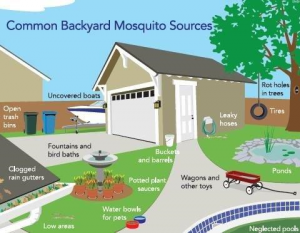A natural disaster such as Hurricane Michael can cause excess standing water which leads nuisance mosquito populations to greatly increase. Floodwater mosquitoes lay their eggs in the moist soil. Amazingly, the eggs survive even when the soil dries out. When the eggs in soil once again have consistent moisture, they hatch! One female mosquito may lay up to 200 eggs per batch . Standing water should be reduced as mush as possible to prevent mosquitoes from developing.
You should protect yourself by using an insect repellant (following all label instructions) with any of these active ingredients or using one of the other strategies:
- DEET
- Picaridin
- Oil of lemon eucalyptus
- Para-menthane diol
- IR3535
- An alternative is to wear long-sleeved shirts and pants – although that’s tough in our hot weather
- Wear clothing that is pre-treated with permethrin or apply a permethrin product to your clothes, but not your skin!
- Avoid getting bitten while you sleep by choosing a place with air conditioning or screens on windows and doors or sleep under a mosquito bed net.
Now let’s talk about mosquito control in your own landscape.
Let’s first explore what kind of environment in your landscape and around your home is friendly to the proliferation of mosquitoes. Adult mosquitoes lay their eggs on or very near water that is still or stagnant. That is because the larvae live in the water but have to come to the surface regularly to breeze. The small delicate larvae need the water surface to be still in order to surface and breathe. Water that is continually moving or flowing inhibits mosquito populations.
Look around your home and landscape for these possible sites of still water that can be excellent mosquito breeding grounds:
- bird baths
- potted plant saucers
- pet dishes
- old tires
- ponds
- roof gutters
- tarps over boats or recreational vehicles
- rain barrels (screen mesh over the opening will prevent females from laying their eggs)
- bromeliads (they hold water in their central cup or leaf axils)
- any other structure that will hold even a small amount of water (I even had them on a heating mat in a greenhouse that had very shallow puddles of water!)
You may want to rid yourself of some of these sources of standing water or empty them every three to four days. What if you have bromeliads, a pond or some other standing water and you want to keep them and yet control mosquitoes? There is an environmentally responsible solution. Some bacteria, Bacillus thuringiensis ssp. israelensis or Bacillus sphaericus, only infects mosquitoes and other close relatives like gnats and blackflies and is harmless to all other organisms. Look for products on the market that contain this bacteria.
For more information:
UF/IFAS Mosquito Information Website
- Sugar Belle Mandarin: A Great Choice for the Florida Panhandle - November 22, 2021
- LandscapeQ & A - August 20, 2021
- Let’s Talk Beneficial Insects - August 18, 2021

